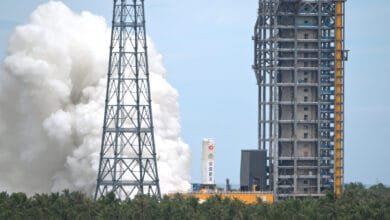Nissan hit by US-China trade war impact

▼ Summary
– Nissan’s third-generation Leaf will be more efficient and spacious than its predecessor, with improved battery thermal management.
– Production of the new Leaf is being reduced due to Chinese export restrictions on rare-earth elements critical for electronics and motors.
– The restrictions have caused a shortage of spare parts, forcing Nissan to cut output at its Japanese factory.
– Suzuki also faced production issues earlier this year due to China’s rare-earth export ban.
– China imposed the restrictions in April as part of the global trade war, with limited six-month export licenses available for US manufacturers.
Nissan faces production challenges for its upcoming Leaf model as US-China trade tensions disrupt supply chains. The automaker has been forced to scale back manufacturing plans for its third-generation electric vehicle due to critical component shortages stemming from China’s export controls on rare-earth minerals. These materials play a vital role in producing electronics and electric motors essential for modern vehicles.
Industry reports indicate Nissan’s Japanese production facility will operate below capacity as it struggles to secure necessary parts. The shortage stems directly from China’s recent export restrictions, implemented earlier this year amid escalating trade disputes with the United States. Similar supply chain disruptions have already impacted other manufacturers, including Suzuki, which temporarily halted production of one model due to the same constraints.
China’s export limitations, introduced in April, require foreign companies to obtain special licenses for rare-earth purchases, each valid for only six months. This policy has created uncertainty for automakers relying on these materials for electric vehicle production. While Nissan’s new Leaf promises improved efficiency and battery management, these advancements now face delays as the company adjusts to constrained component availability.
The situation highlights how geopolitical trade conflicts can ripple through global industries, affecting even well-established manufacturers. As companies navigate these challenges, supply chain resilience becomes increasingly critical for maintaining production schedules and meeting consumer demand.
(Source: Ars Technica)






